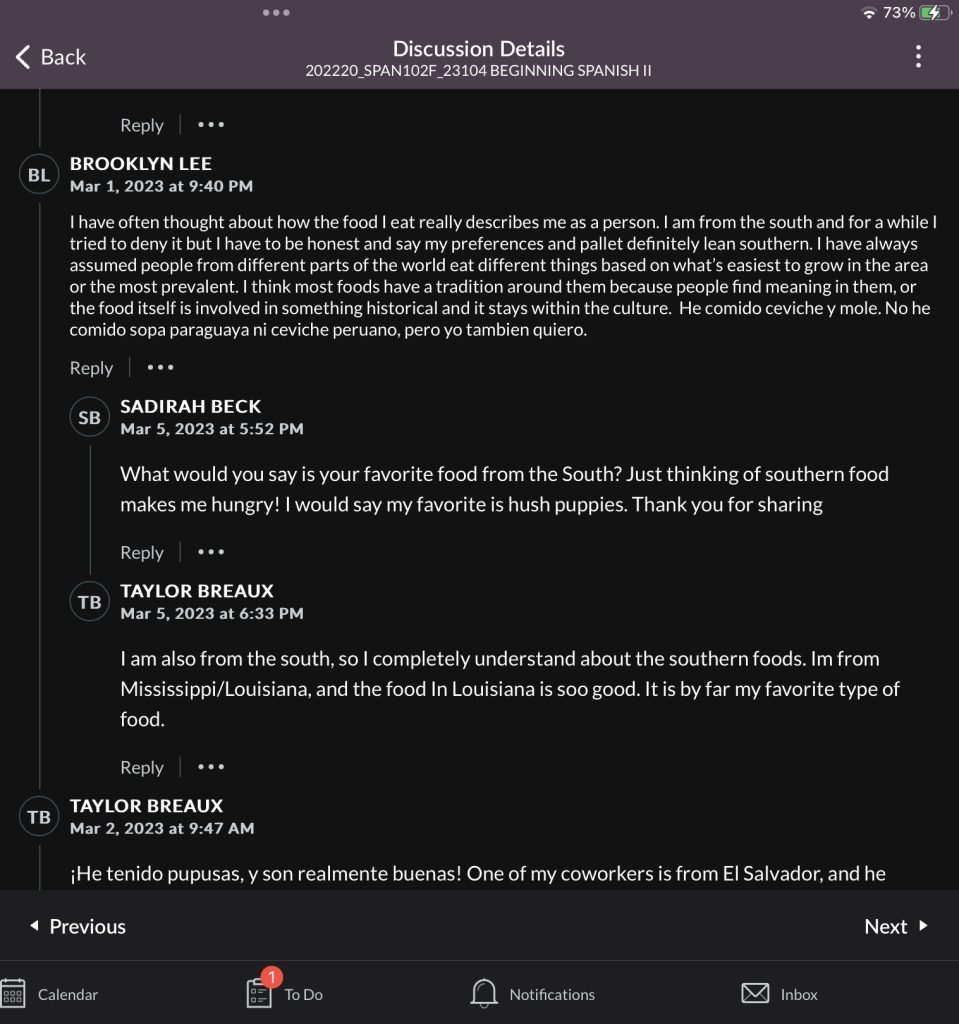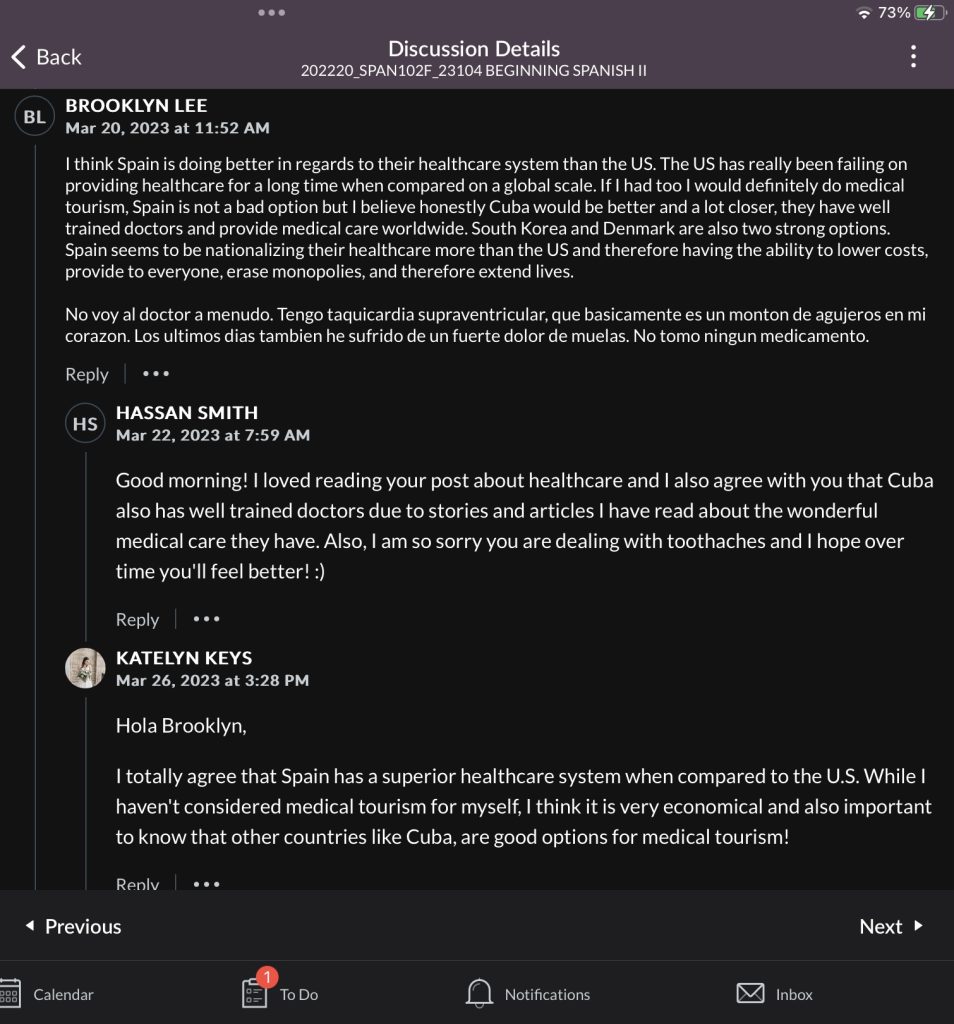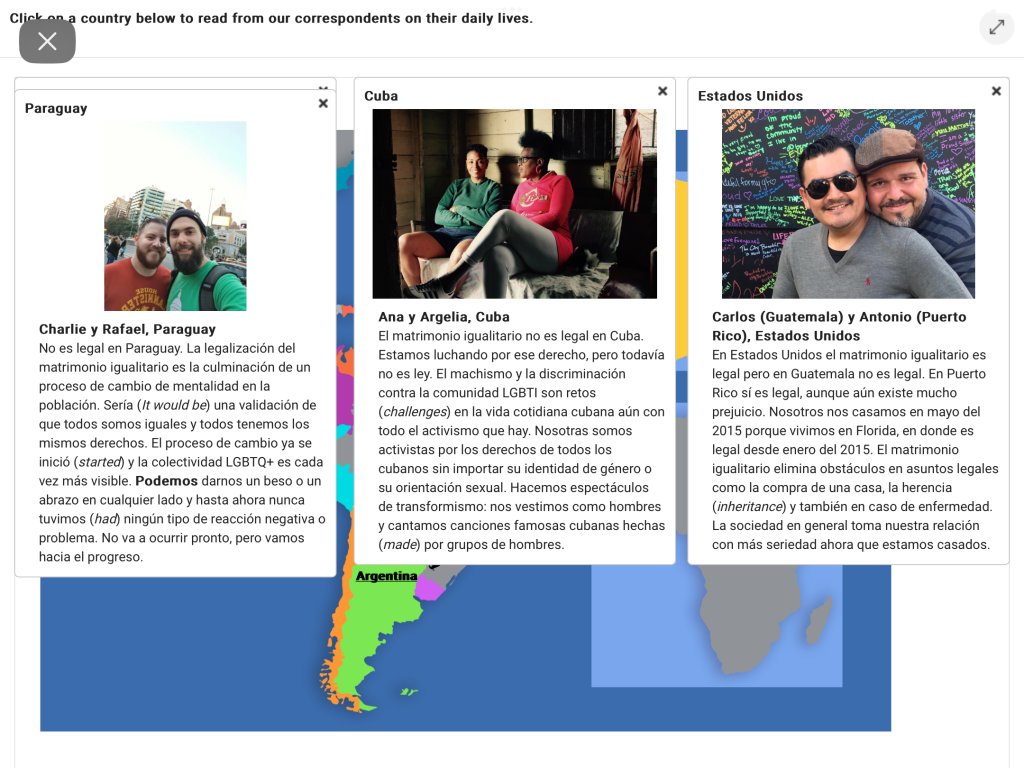Interpretive, Interpersonal, and Presentational Modes of Communication
Reflection
- I believe I have improved this semester with my Spanish. I spent most of my time focusing on learning to speak Spanish more fluently. I normally understand what is being asked, I just struggle to formulate a sentence to respond. Exercises this semester, including more conversations with native speakers, I feel have definitely helped me improve. I also hired a tutor named Rodrigo this semester when I really struggled in an area.
- Having an ability to answer in a full sentence was something I really tried to hone in on. One word answers are easy enough but don’t mean much in the since of communicating.
- My oral exams with the professor are still a tough area for me, compared to my first semester I am doing much better. But yet I feel I have so much room to grow and become more fluent as a conversational partner.
- Timed Tests are definitely a weakness of mine, but I understand the importance of being timed while learning a new language. You don’t have all the time in the world to sit and ponder when communicating with someone in real life, and a timed quiz helps replicate that. I believe they also helped me with time management.
- I feel overall, my journey of learning Spanish has definitely grown. Learning the language as well as the culture.
- I implemented new ways of studying, I used flashcards but not just to audibly remember the words but I also would spell out the word in Spanish when reading the English version. Sometimes even trying to completely formulate a sentence using the word to test my strength at grammar.
- The biggest obstacle for me is remembering correct sentence structure, I usually struggle at being able to fully form a sentence. I usually get inside my own head as I immediately have a one word answer for the question.
- I often also want to answer truthfully when asked a question even if my Spanish vocabulary will not allow me too. I need to learn to sometimes answer questions more basically.
- I feel my written Spanish and memory of the word structure is better. Through much studying I have found I am easily able to hear sounds and identify the letter even if the sound does not correspond with its English counterpart.
- The class also actively participated in discussions on a multitude of topics. This allowed us to connect, learn about cultures, as well as practice our Spanish together. While I struggled finding a way to accurately state my opinion on topics in Spanish, with some practice I was able to pull it together and make my points exactly the way I intended to.

The class discussions also gave us all an opportunity to learn of other cultures as well as go in depth on each others. It helped us all build a strong sense of community through our mutual learning of Spanish and diversity.
Exploring Culture
Doing research for certain topics in the class such as foods, traditions, and occupation preferences really gave me some insight into Hispanic cultures.
In my research, I found many things in my immediate life are not so different from many Spanish speaking countries. Family gatherings/meals seems to be a very popular tradition in many Spanish speaking countries. My talk abroad partner also confirmed this, this is one of the biggest thing I found different from my experiences. Many Spanish speaking countries meet every Sunday for a big meal, most families I have met in the United States only have large family gatherings on holidays. This shows a difference in presence of community and togetherness. Also, many things are similar as gender roles seemed to be a consistent issue throughout both the English speaking and Spanish speaking worlds. Which revealed to me that many of the civil rights and diversity issues we face in the United States are not just isolated here. These problems affect all people, everywhere and are actively being fought against. In my research into healthcare systems in Spanish speaking worlds I found out how competent Cuba’s healthcare system is. With them having many of the worlds best doctors, providing free health care, and even sending their doctors for free to other countries in need.

Engaging in Communities
I have been active in quite a few nonprofits for a few years now, and often I come across people who are non-English speakers. Knowing to communicate with them would be wonderful and immensely helpful.
I also am currently employed at a public library, and from time to time adults and children will come in who speak Spanish. It would be very helpful to be able to communicate with them at least on a basic level to try and assist them and their needs.
As well as many of the children I will be working with will come from very diverse backgrounds and usually are looking for some way to communicate and engage in whatever activity is taking place. Being able to be that person that can provide assistance and help them achieve whatever it is that they need could be very rewarding as well as make them feel as if they can return and be in a safe place.

Interpersonal Communication
I completed two talk abroad sessions, speaking with native Spanish speakers. I was very nervous to do the Talk Abroad assignment, I figured I would lock up and get nervous as I tend too. But I feel I communicated fairly well, the conversation always flowed pretty smoothly and we were even able to have some laughs here and there.
My first experience with Talk Abroad was one of the better experiences I have had speaking Spanish. I did stumble at times and had difficulties in translating certain things, such as my father’s occupation, sports, and other things. But overall, the conversation felt pretty fluid and we were even able to have some laughs. My speaking partner was incredibly helpful and guided me through the entire process. The biggest lesson I learned from this specific Talk Abroad experience is sometimes conversations can be unpredictable and go outside of your knowledge of vocabulary. When that happens you just have to improvise and do your best to communicate.
My second experience with Talk Abroad went fairly well, I just feel a struggled a bit more. The vocabulary and topic was a little more far reaching and I believe I got into my own head, but by the end I feel we were both communicating well. My strength in this seemed to be I was a slowly getting less nervous, I had more of an idea what to expect this time around and I believe it overall benefitted me. My conversation partner was just as helpful this time, I just feel I was not communicating as strongly.
Presentational Speaking
The class completed a few presentational speaking activities this semester. One where we introduced ourselves to the class in a quick video, another where we mocked an interview with our professor.
The first one was the easiest but it was the basics and I had a few notes on hand. I think I excelled at pronunciation and remaining fluid. The second one was more difficult as we had to have a scripted conversation, so it had to be timed right as well as make sense coherently to the conversation. I think spending more time breaking down the conversation so I will be able to respond quicker and more accurately would make my speaking stronger.
Presentational Writing
This semester to assist in my Spanish I outsourced a tutor named Rodrigo. He was very helpful and spent a lot of time teaching me things I was struggling with. One of the things we worked on together often were google docs, loaded with information and graphs to better help me grasp the subject.
It was quite difficult at first, I struggled to understand but over time I began to understand more and Rodrigo helped cater to a style that better helped me understand. I excelled mainly at listening and taking in everything he said. I would like to continue to improve my Spanish through tutoring by continuing to study the guides we create together.
https://docs.google.com/document/d/1JznMw7YjoHofmu6aS2w89rg6N_InTmmWiwKIwvpA2Aedit
Interpretive Listening
For many of the modules we completed through contraseña we would have to listen to a speech in Spanish and pay attention to the details within. This definitely helped me in comprehension.
The first few proved to be difficult for me, but I was able to do decently well. I think the one thing I am strongest at when it comes to Spanish is understanding what is being said to me. So these tasks were usually ones I preferred. With each assignment I realized how the language is complex but if you are able to grasp a few key words you can usually make out what is being said/asked. I think these only helped my listening skills the more I did them.
Interpretive Reading

Within contraseña we also had many activities that presented us with passages in Spanish and the assignment required us to read them in depth and understand them as we needed the information for the assignment. They also gave us an opportunity to learn about the culture of different Spanish speaking countries more in depth.
This is also quite challenging for me at times, I think more than anything visually this can be overwhelming and daunting. But if I paced myself and looked for keywords I was often able to piece together what was being said fairly easily. I think after each assignment I grew stronger in my confidence to know to look through for those words that would allow me to better understand the assignment and what it was asking of me.